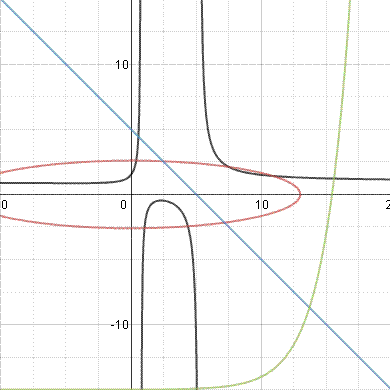Bloody Roots
 Consider a function
f
(
x
)
such that
f
(
2
)
=
f
(
6
)
=
0
. Evaluate the sum of all right sentences.
Consider a function
f
(
x
)
such that
f
(
2
)
=
f
(
6
)
=
0
. Evaluate the sum of all right sentences.
(1) f ( x ) = k ( x 2 − 8 x + 1 2 ) , k ∈ Z
(2) f ( 1 ) ⋅ f ( 7 ) ≥ 0
(4) f ( f ( 2 ) ) = f ( f ( 6 ) )
(8) f ( 4 ) ∈ C
(16) If k k ( ⋯ ) = 2 , then f ( 4 ± k 2 ) = 0 .
(32) f ( 2 0 1 4 ) ( x ) = k , k ∈ R
The answer is 16.
This section requires Javascript.
You are seeing this because something didn't load right. We suggest you, (a) try
refreshing the page, (b) enabling javascript if it is disabled on your browser and,
finally, (c)
loading the
non-javascript version of this page
. We're sorry about the hassle.
1 solution
Wow....I limited my thinking to a quadratic :(
Log in to reply
That's the catch I intended to make when designing this question!
For (1), (2), (4), (8), you might as just just define the function to be
f ( x ) = ( 2 , 0 ) , ( 6 , 0 ) .
For 16, we can just substitute the given equation to itself to yield k 2 = 2 .
(1) - Consider the function f ( x ) = lo g ( ( x − 2 ) ( x − 6 ) + 1 ) . Notice it yields our desired roots without being a quadratic.
(2) - Consider the function f ( x ) = ( x − 2 ) 2 ( x − 6 ) . We have that f ( 1 ) ⋅ f ( 7 ) = − 5 has a negative value.
(4) - Consider the function f ( x ) = x ( x − 2 ) ( x − 6 ) . f ( 0 ) is not defined, and the equality does not hold.
(8) - Consider the function f ( x ) = x − 4 ( x − 2 ) ( x − 6 ) . f ( 4 ) is not defined, and thus it cannot be a complex number.
(16) - Solving the infinite exponentiation, we find k = 2 , and it yields f ( 2 ) = f ( 6 ) = 0 , which is true.
(32) - Consider the function f ( x ) = lo g ( ( x − 2 ) ( x − 6 ) + 1 ) . Its n -th derivative, no matter how big n is, never reaches a constant.